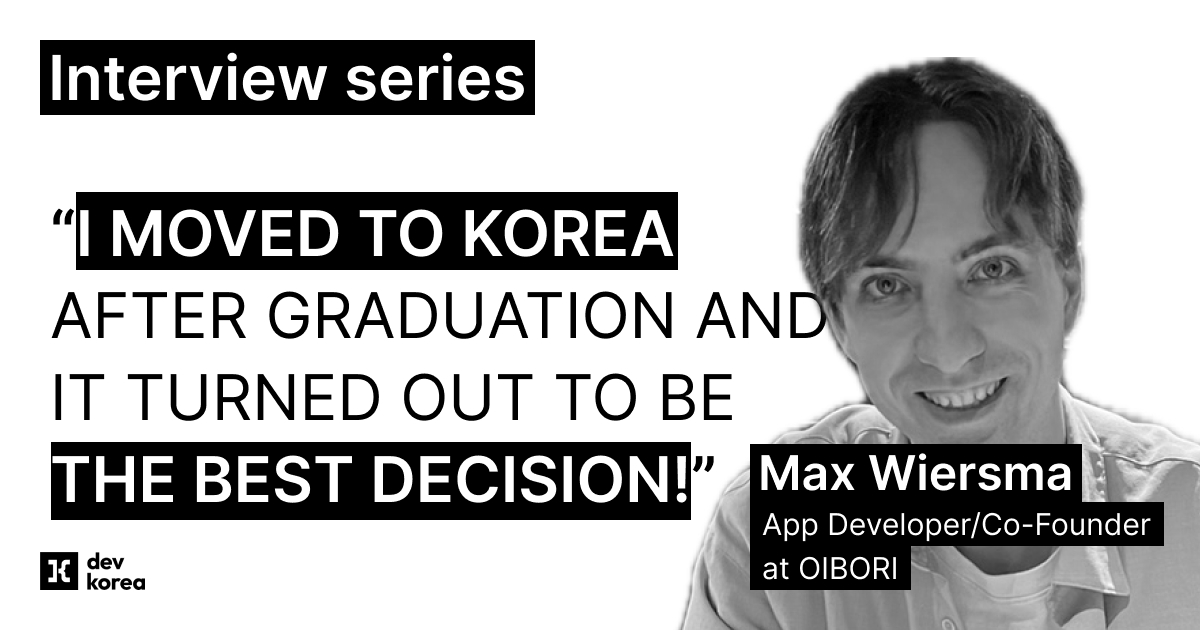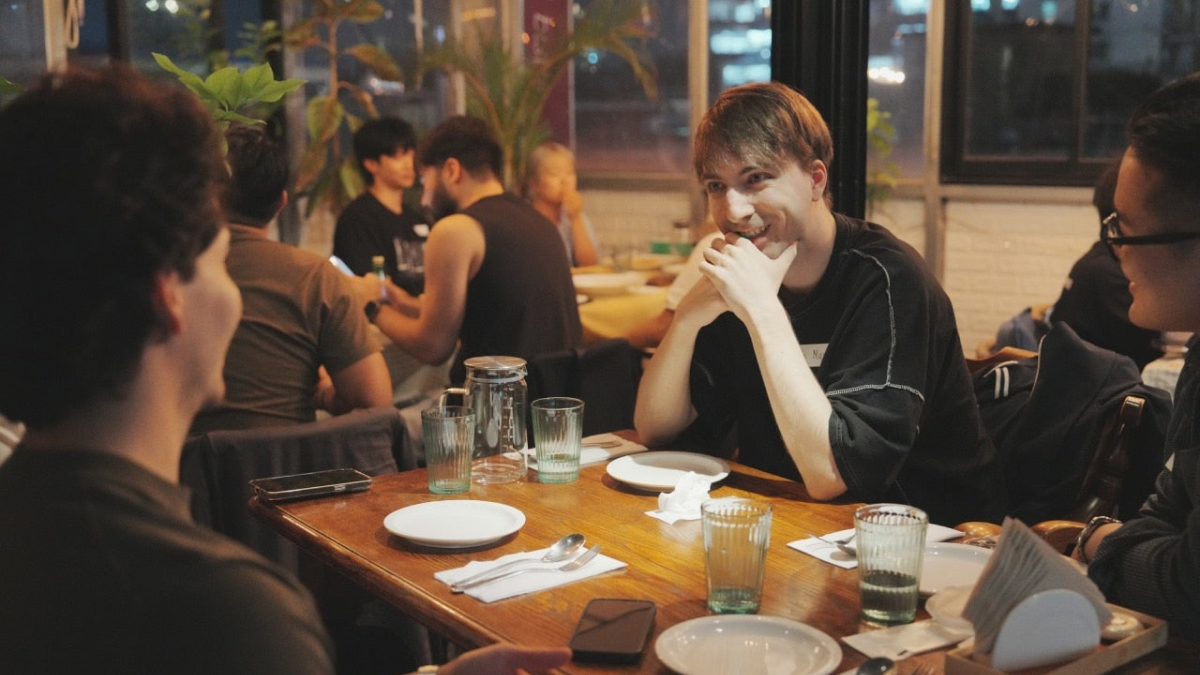
Why a Dutch developer chose Seoul to build AI language apps
Meet Max, a Dutch Co-Founder/Mobile App Developer at OIBORI in Seoul (and remotely, AI engineer at Wordbrew), developing AI-based mobile language learning apps. We sat down with him to learn about his journey from the Netherlands to Korea, what it’s like working in tech here, and why he believes more global talent should consider a tech career in Korea.
Profile snapshot
- Name: Max Wiersma
- Nationality: Dutch
- Current role & company: App Developer/Co-Founder at OIBORI
- Years in Korea: 9.5
- Visa status: H1 -> Tourist -> D2-2 -> D10 -> E7 -> I was 1 year away from F-5-10 but got married so I just got the F6 instead.
- Languages spoken: Dutch, English, Korean
- Previous countries worked in (if any): None
Background & career
Q. Can you briefly introduce yourself and your current role?
I’m Max, originally from the Netherlands, currently in my 10th year in Korea. Having moved here at 21, I’ve spent the large majority of my life here, climbing up from initially a working holiday into Korean university, the Korean job market, and now on my own.
I currently split my time between developing mobile language learning apps (full-stack, but focused on the AI parts) and working as a freelance AI engineer for US startup Wordbrew.
Q. What was your career path before moving to Korea?
I came to Korea straight out of university in the Netherlands, so all my experience is in Korea.
Q. What inspired you to work in Korea?
I didn’t really vibe with the Netherlands and thought I’d enjoy it more elsewhere. Ever since I was 13, I already knew I would end up living abroad, but not sure where. I had a few countries in mind but it was more rational— I hadn’t gotten emotionally attached to any of them. Korea wasn’t really among them. Then at 17, right after final high school exams, I saw some Korean content online and literally within a matter of days I knew that I was going to live in Korea. I can’t really explain it. In the end, it took four years from that day until I was able to move here, but throughout that time I never even had a sliver of doubt. I came here as soon as I graduated and luckily it turned out to be the right choice for me!
As for working, I wasn’t born into wealth, so I naturally had to get a job here to make a living when I finished uni here in Korea (I graduated twice—once in each country).
Experience working in Korea
Q. Can you share your journey working in Korea, from your first company to your current role, and how it all led you to build AI-powered language apps?
After graduating here, I started all the way down on the Korean corporate ladder at a small startup in Daegu. The salary was just high enough to get an E-7 in 2021. Such companies are naturally fully Korean-speaking; I actually doubt there’s a single English-speaking IT company outside of Seoul/성남.
I worked as one of three backend developers, together with two mobile app devs and one web frontend dev.
Starting so “low” ended up being a huge boon skill-up-wise, because it meant I was a core member of the company right from the start. It’s a huge difference from being at a large company where you’re responsible for a very specific part of a huge system (if even that, as a junior dev), as I later witnessed myself.
From designing database schemas, business logic, and API development to infrastructure—you name it. When you’re the only backend dev on a project (we often had multiple projects at a time, with one to two of us working on each), you get to do everything. My workday was probably that of the standard Korean backend developer. We’d start the day with a short standup; I think I worked 9:30–18:30, coding all day, with occasional meetings interspersed.
During my time there, the company grew in revenue and size, so by the time I left the engineering headcount had doubled.
After 1.5 years, the work got samey and I felt I’d learned most of what there was to learn there. I also wanted to move to Seoul, so I quit my job and went looking for opportunities. I did some direct applications, but my biggest source of opportunities was actually coding tests. Although tough to crack, an advantage as a foreign jobseeker is that they’re much more resistant to any biases than traditional applications. It gives them a hard, reliable score to directly compare with other applicants, including all locals. Sure, your name is still connected to the score, but it takes away most of the potential worries they may have about your foreignness.
During this process, a recruiter from a large American tech company reached out through LinkedIn asking if I’d be interested in applying for their Seoul office. What stood out to them about my profile was having learned Korean through self-studying, my grades at uni in Korea, as well as the work I did at the startup. I’ve sometimes heard people say that as a foreigner, your grades here are completely meaningless when getting a job, but at least for me, that wasn’t the case.
One more thing I can tell you is that of the six job offers I’ve received in my near-decade here, I wouldn’t have gotten a single one of them if I weren’t fluent in Korean. On the other hand, Dev Korea wasn’t around back then! Just by looking at the job offers posted on Dev Korea, it’s clear that there are many more English-speaking opportunities now compared to back then.
At the US company, we used a mix of Korean and English. We’d spend four out of five days on-site at clients, and on my first two projects, my teammates did not speak Korean, so among ourselves everything went in English. The customers we worked with generally spoke good English, but I sometimes switched to Korean when the language barrier caused confusion. The work itself was very different from my first job, where we made exactly what the client asked for. Here, the first question for us to solve was: What is the most impactful thing that we could possibly make that would provide the biggest tangible direct benefit to the client’s business? Next: How are we going to make this? What should the interface look like? It was true zero-to-implementation, from ideation to data engineering to application development. This made for an incredible opportunity to improve a whole other skill set, perfectly aligned with becoming an entrepreneur afterward. What I also loved is that this allowed me to be one of the first in Korea to actively create these applications based on LLMs, right since GPT-3.5 came out. So for the last 2.5 years, I’ve been spending every day making AI-based applications.
I’m now using this experience to build language learning apps. We just released TOPIK Easy6—the first app to give instant, detailed feedback and score predictions specifically for the writing part of TOPIK II. Companies definitely look at TOPIK scores when evaluating non-native applicants, so we’d love it if our app could help people get that level 6 and succeed in the job market.
Lifestyle & community
Q. What’s your life outside of work like? How have you built your social life here?
Mostly through work and university. When I studied here, our major was relatively big at 130+ students in my year. I also joined major and campus clubs, and after graduating have been part of several hobby meetups through apps like 소모임. I still stay in touch with ex-colleagues from my second job, and most importantly, am very happily married—our third anniversary is coming up soon.

Q. How much has knowing Korean (or learning it) helped in your daily life?
It’s hard to say because I haven’t truly experienced what it would be like without knowing it, as I was at an intermediate level when I first came to live here. Still, even nowadays 99% of local events, meetups, apps, and websites are fully in Korean. Even in the Netherlands (known to have the highest percentage of fluent English speakers among non-native countries), this is pretty similar in the offline world—people are very accommodating, but the main language at social happenings is the local one, and things will be hard to follow without knowing it. In both countries, there are plenty of people living happy lives fully in English, so depending on your personality, it may not be a barrier. For me, it’s an absolute necessity, as I can’t stand being dependent on someone for such things. Just a personality trait!
Reflections & advice
Q. What tips would you give to someone searching for a tech job in Korea?
Kind of talked about this above.
Language fluency means you have a 10× bigger pool of jobs to apply to. Don’t be scared of putting a Korean name on your resume if you’re fluent—plenty of Koreans who live abroad put English names on their own resumes.
Prioritize. If you can’t find a job but are 100% committed to staying in Korea whatever it takes, look outside of Seoul at smaller companies. They can barely find locals to fill their positions, making it much easier to get your foot in the door. At the same time, when doing so, don’t focus on salary or location but look at their tech stack and vibe of the CEO/CTO. It’s a very effective proxy for the atmosphere and modernity of the company. Rule of thumb—if they’re still using the same technologies as in 2005, their working culture will also be from 2005.
Q. What can Korean companies do to better support and integrate international employees?
Blind applications—no names and pictures when reviewing.
Q. Would you recommend Korea to other international tech professionals, and why?
It’s difficult for me to compare because I haven't worked elsewhere. With that said, I think Korea is a great place to live, and the workplace culture has improved massively over the last 10 years, continuing to do so. Things like mandatory after-work drinking sessions with the team have plummeted in frequency, so online references to those are often outdated.
What I see as another advantage is that while sometimes people complain about e.g. Google Maps being bad in Korea and KakaoTalk being only used in Korea, overall I think it’s fantastic that Korea has its own big tech companies, with the large majority of "daily life" apps here developed locally. The benefits are truly numerous: sovereignty, human custom service, large economic benefits and products developed in a way that it specifically suits the needs of local users. As a developer it can be really cool to be part of that, and there's very few countries with such a strong domestic tech ecosystem - China and potentially Russia are the only other ones to speak of, with Japan being somewhere in between. You won't find similar anywhere in Europe, that's for sure.
Rapid fire
- Favorite Korean food: Honestly, my mother-in-law’s home cooking. Besides that, good 정식 (jeongsik—Korean set meal), especially 전라도 (Jeollado—Jeolla Province style).
- One must-visit place in Korea: Electronic music festivals
- Favorite Korean word or phrase: 어이가 없다 (oiga optta meaning “That’s absurd”)
Connect with Max
If you want to be next and contribute, send us an email to florian@dev-korea.com.
Ready to explore your next move? Visit Dev Korea to check the latest job openings, or if you’re an employer, post a job and connect with our vibrant community of tech talent eager to contribute to Korea’s innovation ecosystem.